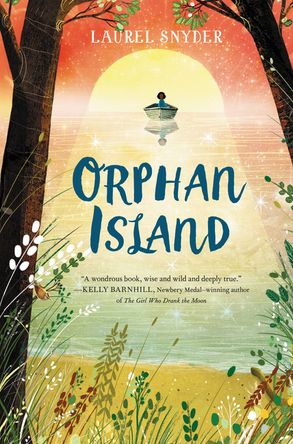I always tell my students that the best books have more than one theme. Orphan Island is one of those books. It would take more than one reading to truly appreciate this middle grade fantasy for what it is. There is so much depth to this story, so many beautiful layers to unwrap and savor. It isn't just a book to be read and shelved, but a book that begs to be discussed and enjoyed with other readers.
Jinny is a tween who shares an island with 8 other orphans of different ages. The island is a paradise - much like Neverland, but without pirates and crazy clock-ticking crocodiles. Within this paradise, each of the 9 orphans works together for the common good. They are a family, and it's a beautiful family for the reader to get to know.
There's one caveat, however. Only 9 orphans may stay on the island. Each year, a mysterious green boat arrives, bringing a new child and taking the oldest child away to an unknown destination. The next oldest child must step up as the new Elder, taking care of the new orphan and teaching the others what he or she has learned about life and survival. Each child knows that the final day will come when he or she must choose to step into the boat and leave the island to the younger children. Jinny's preparation for that final day makes up the plot of this book.
I would love to teach this book. There are so many paired texts that would work well with it. Peter Pan is an obvious choice, but there are several others that are referenced in this story - Where the Wild Things Are, The Wonderful Wizard of Oz, and Alice in Wonderland come to mind. There could also be tie-ins to religious themes for my parochial school friends. My only pause is that Jinny's menstrual cycle is briefly mentioned - although not in great detail - so the book may be better for the upper range of the middle grades. There isn't anything else that would be of concern to the middle grades teacher.
Ultimately, readers who discuss this book are going to answer these questions:
1. Should you choose to grow up, or not?
2. What are the repercussions if you keep choosing childish
behavior?
3. What is your responsibility to children younger than you?
4. What is your responsibility to take care of your world and
environment?
5. What is the best way to teach others?
6. When does being protective of someone turn into enabling?
What effect does this have on a person?
I highly recommend this book, either for your own enjoyment or as a teacher. But set aside a day to read it, because you won't be able to put it down.
Jinny is a tween who shares an island with 8 other orphans of different ages. The island is a paradise - much like Neverland, but without pirates and crazy clock-ticking crocodiles. Within this paradise, each of the 9 orphans works together for the common good. They are a family, and it's a beautiful family for the reader to get to know.
There's one caveat, however. Only 9 orphans may stay on the island. Each year, a mysterious green boat arrives, bringing a new child and taking the oldest child away to an unknown destination. The next oldest child must step up as the new Elder, taking care of the new orphan and teaching the others what he or she has learned about life and survival. Each child knows that the final day will come when he or she must choose to step into the boat and leave the island to the younger children. Jinny's preparation for that final day makes up the plot of this book.
I would love to teach this book. There are so many paired texts that would work well with it. Peter Pan is an obvious choice, but there are several others that are referenced in this story - Where the Wild Things Are, The Wonderful Wizard of Oz, and Alice in Wonderland come to mind. There could also be tie-ins to religious themes for my parochial school friends. My only pause is that Jinny's menstrual cycle is briefly mentioned - although not in great detail - so the book may be better for the upper range of the middle grades. There isn't anything else that would be of concern to the middle grades teacher.
Ultimately, readers who discuss this book are going to answer these questions:
1. Should you choose to grow up, or not?
2. What are the repercussions if you keep choosing childish
behavior?
3. What is your responsibility to children younger than you?
4. What is your responsibility to take care of your world and
environment?
5. What is the best way to teach others?
6. When does being protective of someone turn into enabling?
What effect does this have on a person?
I highly recommend this book, either for your own enjoyment or as a teacher. But set aside a day to read it, because you won't be able to put it down.

No comments:
Post a Comment